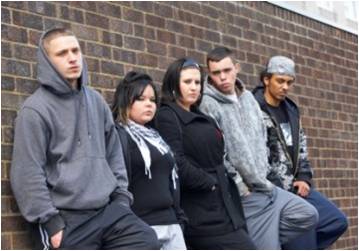.jpg)
It usually starts out fine… You meet somebody. After spending some time with them, you decide you really like them. They’re nice, funny, they make you feel good. They treat you right. You start dating them and you fall in love. But, sometimes, after you REALLY get to know somebody, that will all change and stuff will start happening that you never thought would happen to you.
Dating abuse happens a lot more in teen relationships than a lot of people realize. In fact, over 1.5 million high school students experience physical violence from someone they’re dating every year. Approximately 1 in 3 teens are victims of physical, sexual, emotional or verbal abuse from a dating partner.
What exactly is dating abuse?
Here are the different types of abuse:
- Physical abuse is when your significant other hurts you physically in any way. It could be punching, hitting, slapping, grabbing, pushing, shoving, kicking, choking. It could even be holding you down or not letting you get away. Those kinds of things are NEVER okay.
- Sexual abuse is when your partner makes you do things sexually that you don’t want to do. It could be that they want to make out and fool around, you say no, and they do it anyway. It could be unwanted touching. It could even be rape.
- Emotional abuse is when they make you feel bad about yourself, make you feel like you’re doing something wrong, try to control you, embarrass you in front of others.
- Verbal abuse is when they say things to you that are negative and hurtful. For example, telling you you’re fat and ugly, you’re stupid, they don’t know why they’re even with you,you can’t do anything right, calling you names, etc.
People abuse others because of THEIR OWN ISSUES… it has nothing to do with the victims. They just feel like they need somebody to lash out at to fix their problems with themselves. They like having control over someone, and they like making someone else feel worthless because THEY have self-esteem issues of their own. It could also be that they grew up seeing an abusive relationship, so they think it’s normal. Or maybe they have anger issues, they hang with the wrong crowd, they’re on drugs and drink alcohol, they have a history of being aggressive and bullying other people. Whatever it is, it isn’t YOUR fault that they’re doing that to you. There are no excuses. You have done NOTHING to deserve that.
Teens who are victims of dating abuse are more likely to do bad in school, drink alcohol, do drugs, attempt suicide, get in physical fights with others, and carry violence into their future relationships.
As a teenager who is still developing emotionally, your relationships affect you tremendously. A really good, healthy relationship can do wonders for your self-esteem and emotional/mental development. At the same time, a bad, unhealthy relationship can cause some terrible short term and long term negative effects that you will carry with you.
People who are victims of abuse often continue to stay in the relationship and pretend like nothing is wrong. It’s usually because they’re embarrassed to admit that something like that is happening to them. Or sometimes, again, if they’ve grown up seeing an abusive relationship, they might even think it’s normal. Or they could be blind to it because they really are in love with their abuser.
If you think one of your friends is in an unhealthy relationship, talk to them about it. Tell them about some of the signs you’ve seen based on the way their partner treats them. If they’re in denial about it, tell an adult what’s going on and get help. The longer you wait, the worse it could get.
If YOU are in an abusive relationship, don’t be ashamed. It isn’t your fault! It really has nothing to do with you. Your partner has issues, and they are not your problem… Don’t try to fix them, because it won’t work. Get out ASAP. Let the people around you know what’s been happening so they can support and protect you if your partner gets angry when you break things off.
There are several hotlines you can call if you’re in an abusive relationship and need help. These people are available 24/7 to give you tips, advice, point you in the direction of services and help, or just when you need someone to talk to.
- Love Is Respect: you can call them at 1-866-331-9474, text “loveis” to 22522, or chat online at loveisrespect.org.
- RAINN (Rape, Abuse, & Incest National Network): call them at 1-800-656-HOPE or chat online at rainn.org
- National Domestic Violence Hotline: call them at 1-800-799-SAFE, or chat online at thehotline.org
Dating is supposed to be FUN! Your significant other is supposed to make you happy, make you feel special and loved, and take care of you. Someone who truly cares about you will do everything in their power to make you happy. Don’t settle for anything less than that.



